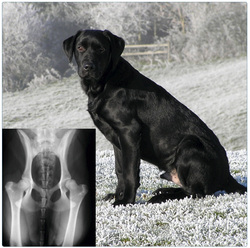
Despite years of careful breeding and expensive testing, hip dysplasia remains one of the most significant health problems in dogs. Instead of selecting strictly for phenotype, considerably more rapid improvement in hip scores has been possible using estimates of a dog's breeding value based on hip scores and genetic analysis of pedigree data. A team of scientists from the UK used Estimated Breeding Values (EBV) to estimate the genetic risk of dogs from 15 breeds (Akita, Bearded Collie, Bernese Mountain Dog, Border Collie, English Setter, Flat Coat Retriever, Gordon Setter, Golden Retriever, German Shepherd Dog, Labrador Retriever, Newfoundland, Rottweiler, Rhodesian Ridgeback, Siberian Husky, and Tibetan Terrier). They found that EBV provided much more reliable information about the breeding value of individual dogs in the breeds they studied, and because of this they expect that improvement in hip quality could be achieved much faster than by selecting on phenotype alone. EBV has long been used in breeding of other domestic animals (e.g., livestock), and it is already in use for at least some breeds in Norway, Finland, Denmark, and Germany, and a program for Labradors has now been implemented in the US. They anticipate that EBV values for some of the most popular breeds will be available online sometime in 2013 for dogs registered in the UK. (BMC Genetics 2013 14:16)
 RSS Feed
RSS Feed





